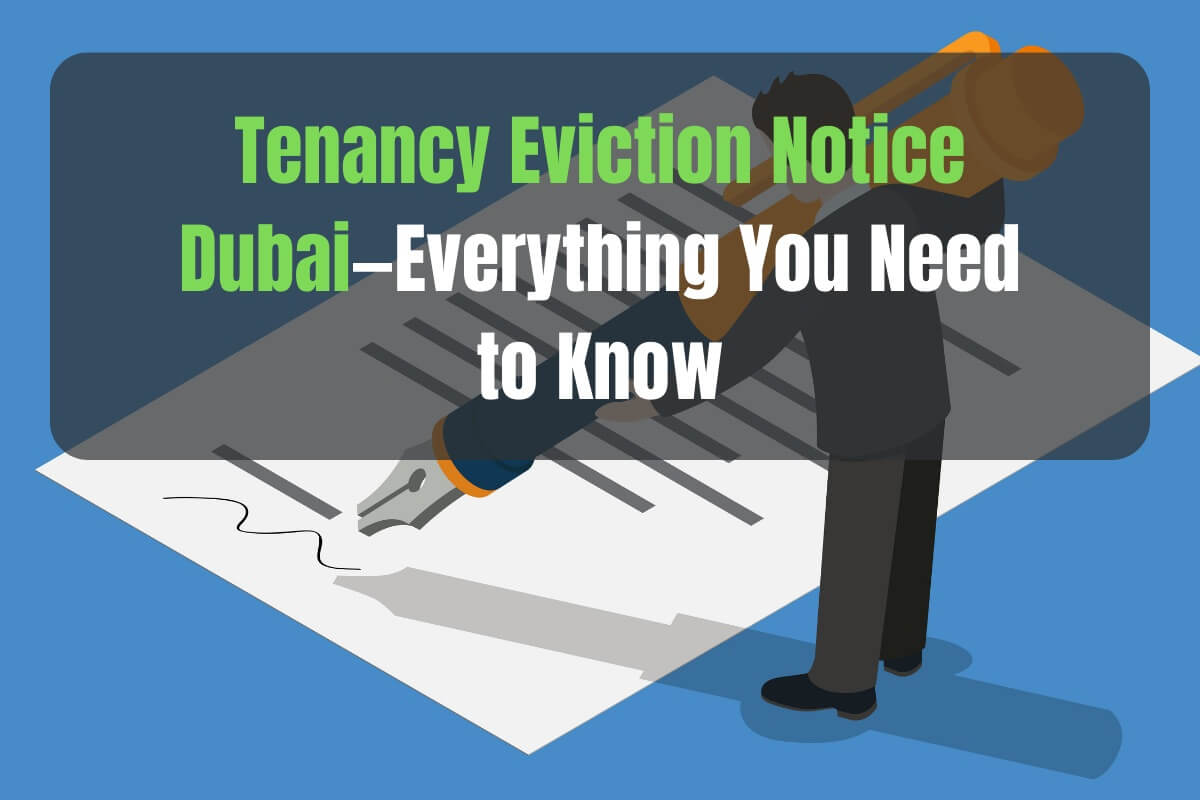Dubai real estate is experiencing a booming period, especially after the COVID-19 era. As the demand for rental properties in Dubai has increased, landlords or homeowners are trying to take advantage of this increase in demand via illegal and unethical means.
For example, landlords nowadays have been found making new tenancy contracts even before their running contracts end. Tenants often get tenancy eviction notice in Dubai out of nowhere. That is why it is important for the tenants to learn about their rights related to tenancy eviction notices in Dubai so that they can deal with their landlords accordingly.
Here is everything you need to know about tenancy eviction notice Dubai.
RERA Tenancy Law for Tenancy Eviction Notice Dubai
Rental prices in Dubai have gone up since the pandemic. Landlords are using this opportunity to raise rent or replace current tenants with new ones to make more profits. Tenants can use tools like the RERA rent calculator or DLD’s property lease evaluation services to see the market rates in Dubai.
Landlords want to make more profit by increasing rent based on their property’s lease rates. Therefore, it is important to know and understand the RERA tenancy law in Dubai to know your rights and responsibilities as a tenant.
According to Law no. (26) of 2007, amended by Law No. (33) of 2008, there are certain cases in which the landlord can send tenancy eviction notice in Dubai before the contract expires. Here is a detailed overview of such cases.
Cases in Which the Landlord Can Send Tenancy Eviction Notice in Dubai
Following are the cases in which the landlord can serve the eviction notice to tenants before the contract expires.
1. If the tenant fails to pay rent
If rent remains unpaid after 30 days notice from the landlord, the owner can ask the tenants to vacate the premises. This eviction notice is issued due to non-payment of rent within the given time period. It is important to note that the landlord cannot send an eviction notice before the 30-day period for rent payment.
2. If the tenant misuses the property
Renting an apartment in Dubai requires compliance with the terms outlined in the tenancy agreement and local laws. If the tenants use the property in violation of these regulations, the landlord reserves the right to issue an eviction notice to the tenants.
Failure to fulfill obligations as outlined by RERA laws and the tenancy agreement may lead to lease termination. The landlord can send an eviction notice in such cases, and the tenants will have to evict the property within 30 days.
3. If the tenants sublease the property
Subleasing the property without proper approval may lead to property eviction in Dubai. In such cases, the landlord has the authority to remove the sub-tenant from the premises. Furthermore, the sub-tenant may seek compensation from the tenant.
4. If the tenant damages the rental property
Tenants who cause damage to the property or compromise its safety may face eviction notices in Dubai. Additionally, unauthorized alterations to the property without landlord and regulatory authorities’ approval can lead to significant consequences.
In this case, the landlord has the option to submit a technical report signed or attested by Dubai Municipality along with the eviction notice, asking the tenants to vacate the premises within thirty days.
Tenancy Eviction Notice Dubai after the Tenancy Contract Ends
Once the tenancy contract expires, landlords are unable to issue eviction notices to tenants in Dubai except for the following reasons.
a) Renovation or demolition of the property
A landlord has the authority to issue a tenancy eviction notice in Dubai if required by a government entity for property demolition or reconstruction due to the Emirate’s development plans.
Furthermore, landlords may send eviction notice upon the contract’s expiration if significant renovations or maintenance are necessary, which cannot be undertaken while tenants reside on the premises.
In cases where property alterations are necessary, landlords must provide a technical report from Dubai Municipality.
Additionally, landlords may issue eviction notices following approval from the relevant authority for property demolition to facilitate reconstruction.
b) For the landlord’s personal use
Landlords in Dubai have the right to issue eviction notices to tenants if they intend to use the property for personal use or for their close (first-degree) family members. However, the Law prohibits the landlords from renting out the property for one year following the request for possession for personal use.
When landlords seek eviction after the expiration of the tenancy contract, they must provide tenants with a ninety-day notice before the agreement ends.
Summing it up
RERA Dubai equally protects investors, landlords, and tenants. However, it is important for tenants to be aware of their rights and responsibilities. The abovementioned are some common cases in which homeowners can send tenancy eviction notices in Dubai.
You can also consult a registered real estate agent in Dubai before signing a tenancy contract and renting a residential unit.






